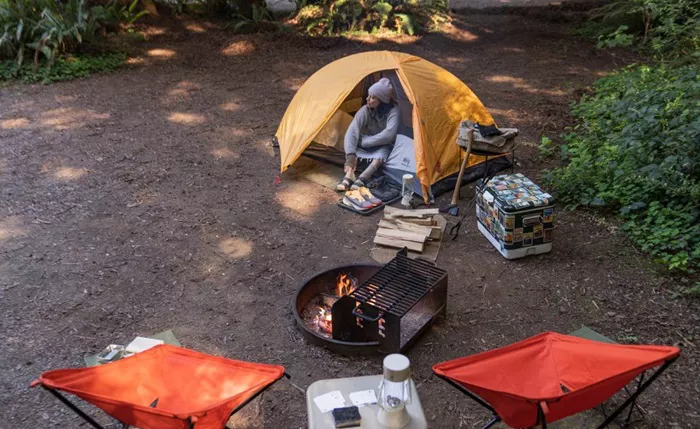Camping offers an escape from the hustle and bustle of daily life, even if only for a short period. For a brief camping trip, packing smartly ensures a comfortable and enjoyable experience. This guide outlines essential items to bring, organized into key categories for simplicity and thoroughness.
1. Shelter and Sleeping Gear
Tent
A reliable tent is the cornerstone of any camping trip. For a short trip, a tent that is quick to set up and lightweight is ideal. Consider a tent with weather-resistant features to keep you dry and comfortable.
SEE ALSO: The 7 Best Motorcycle Tent
Sleeping Bag
Choose a sleeping bag suited to the expected weather. For summer camping, a lightweight sleeping bag will suffice. For cooler temperatures, opt for a bag with higher insulation. Ensure the bag is compact for easy packing.
Sleeping Pad or Air Mattress
A sleeping pad adds comfort and insulation from the ground. An air mattress provides additional comfort but requires a pump, which could be an extra item to consider.
Pillow
Bring a camping pillow or a small, compressible pillow for a good night’s sleep. Inflatable pillows are another space-saving option.
2. Clothing
Base Layers
Wear moisture-wicking base layers to keep dry and comfortable. These layers help regulate body temperature and manage sweat.
Insulating Layers
Pack an insulating layer like a fleece jacket or down vest. Even in summer, temperatures can drop at night.
Outer Layers
Bring a waterproof and windproof jacket. Weather can be unpredictable, and staying dry is crucial for comfort.
Footwear
Pack sturdy hiking boots or shoes suitable for the terrain. Comfortable socks are also essential to prevent blisters and keep feet dry.
Hats and Gloves
Even in warmer weather, a hat and gloves can be useful, especially in cooler evenings or unexpected weather changes.
Extra Clothing
Include extra underwear and socks. It’s better to have a few changes in case of unexpected weather or accidents.
3. Cooking and Food Supplies
Portable Stove
A compact camping stove is essential for cooking meals. Gas stoves are popular for their ease of use and efficiency.
Fuel
Ensure you bring enough fuel for your stove. Check local regulations regarding fuel canisters, as some areas have restrictions.
Cookware
Pack lightweight, durable cookware. A small pot, pan, and utensils should cover most cooking needs. Consider a compact, multi-purpose utensil to save space.
Eating Utensils
Bring a spoon, fork, and knife. Some camping sets include a combination utensil to reduce packing space.
Food
Plan meals in advance and pack non-perishable food items. Include snacks, as energy levels can drop during outdoor activities. Prepare easy-to-cook meals or pre-cooked options for convenience.
Water and Water Treatment
Bring enough water for drinking, cooking, and cleaning. A water filter or purification tablets are essential if you plan to use natural water sources.
Cooler
If bringing perishable items, a cooler with ice packs will keep food fresh. Choose a size that fits your needs without taking up excessive space.
4. Personal Items
First Aid Kit
A well-stocked first aid kit is crucial for treating minor injuries and addressing emergencies. Include bandages, antiseptics, pain relievers, and any personal medications.
Toiletries
Pack personal hygiene items such as toothbrush, toothpaste, and biodegradable soap. Bring a small shovel or trowel for digging a cat hole if there are no facilities.
Insect Repellent
Insect repellent helps protect against bites and stings. Choose a product with DEET or natural alternatives.
Sunscreen
Sunscreen protects against sunburn. Choose a broad-spectrum SPF and reapply as needed.
Towel
A quick-dry towel is useful for drying off after swimming or washing.
Personal Identification
Carry personal identification, a map, and a compass or GPS device. It’s also wise to leave an itinerary with someone who can track your whereabouts in case of emergencies.
5. Safety and Navigation
Headlamp or Flashlight
A headlamp or flashlight is essential for navigating and tasks after dark. Bring extra batteries to ensure they remain functional throughout your trip.
Multitool or Knife
A multitool or knife is invaluable for a variety of tasks, from food preparation to equipment repairs.
Fire Starter
Pack waterproof matches, a lighter, or a fire starter kit to safely start a campfire. Always follow local fire regulations.
Bear Spray (if applicable)
If camping in bear country, bear spray is a must for safety. Learn how to use it correctly and store it securely.
6. Extras and Comfort Items
Camping Chair
A lightweight, foldable camping chair enhances comfort around the campfire or at your campsite.
Camera or Binoculars
Capture memories or observe wildlife with a camera or binoculars. Ensure they are compact and easy to carry.
Notebook and Pen
A notebook and pen can be handy for jotting down thoughts, keeping a journal, or making notes about the trip.
Entertainment
For downtime, consider packing a book, cards, or a small game. These can provide entertainment during relaxation periods.
Reusable Bags
Bring reusable bags for trash and to organize gear. Always follow Leave No Trace principles and pack out all waste.
Conclusion
Packing for a short camping trip involves balancing essential items with comfort and convenience. By organizing your gear into categories and choosing items that meet your needs while being lightweight and space-efficient, you can ensure a successful and enjoyable outdoor experience. Proper preparation makes all the difference in turning a short camping trip into a memorable adventure.

